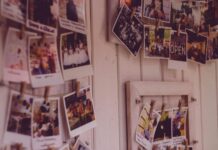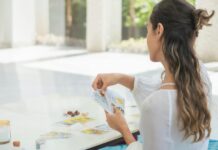
Courtesy of Wesley Ng
When you look in the mirror, what do you see? Do you think that there is something wrong with the way you look? Do you think other people will judge you because of the color of your skin or the clothes that you wear? Do you feel comfortable with your own image, or do you struggle with it? If you struggle with it, how can you one day come to accept yourself?
These were the types of questions that Perfect Imperfections meant to tackle on the evening of Feb. 21. The program was sponsored by a slew of student organizations including The Well, Student Disability Union (SDU), LGBT Resource Center, Chicano Student Programs and African Student Programs, and it focused on addressing issues with body image and identity to go in hand with Body Image Awareness Month.
The event took place in HUB 302, where a good amount of students turned up to hear the words of guest speaker Zarifa Roberson, founder and CEO of i.d.e.a.l. (Individuals with Disabilities Express About Life) Magazine. However, Roberson, was running late thanks her to flight from Philadelphia being delayed from harsh weather, so Erica Peterson of the Student Disability Union took the helm. She encouraged everyone who attended to write down something about their body that is different from the standard on a post-it note and stick it to the wall. Then she asked us how that process felt. Only a few students answered that it was somewhat easy to do because it was something that they accepted about themselves. However, almost everyone raised their hands when asked if they could see themselves coming to accept the aspect about themselves that they posted to the wall.
Peterson then gave the stage to fellow associates of SDU, Terrance Stewart and Brian Molina. “The way I feel usually depends on how people react to me,” said Stewart, who went on to talk about the pain he often feels whenever he is seen more as a criminal than a UCR student just because of his skin color and choice of clothing. Stewart also talked about how he makes an effort to hide his disabilities as best as he can and refuses almost every kind of special needs because he doesn’t want to take the easy way out. “Now I start to see my disability as a strength,” he said, “because it pushes me to work harder.”
Molina then discussed how growing up as a young Hispanic man in a low-income community he felt that his life had little value and that there were no superheroes that were like him to look up to. If he hadn’t reinvented himself and boosted his self-confidence with his bodybuilding, he might have ended up as a gang member, because those were the only people like him in his community that had any sense of pride. Before stepping down, he told us his personal philosophy when it comes to body image: “Don’t be cocky, be confident. Don’t be self-conscious, be conscious of yourself.”
As the audience awaited Roberson’s arrival, Peterson asked us to form a circle of chairs and invited us all to share about any personal experiences we’ve had with body image here at UCR. Several students talked about the painful experience of being in a group of other people and getting passed over as if they didn’t exist, probably due to their appearance. Some students talked about how they try to be as friendly as possible to let their personality make them more than another face in the crowd, while others felt the need to seclude themselves from people, lest they be judged.
Roberson finally arrived with many apologies some time after 7 p.m., over two hours after she was scheduled to arrive. Even though the number of students that had stuck around that late had dwindled, Roberson still showed charm and an enthusiasm to speak. One of the first things she wanted to talk about was her goal of dispelling the idea that disabled people are asexual beings. She gave a few of her own personal anecdotes, one involving the conversation she had requesting an intimacy facilitator (someone who helps people with severe physical disabilities perform sexual acts) and another about a man not wanting to have sex with her because he didn’t want to hurt her. “Your loss,” she told him, “because it would have been me hurting you.”
Roberson’s own path to self-acceptance wasn’t easy. As a disabled African-American female, she would watch commercials and look at magazines and always wonder, “Where do I fit in?” Roberson, who deals with a form of arthritis affecting the whole body, limiting mobility and self-care, continued on.
On top of that, she has a twin sister who is without disability, which added an extra layer of strife in life as she constantly believed she could be exactly the same as her sister and was faced with bitter disappointment whenever she couldn’t. She was bullied and had low self-esteem throughout high school.
As she got older, she said that she “became accepting of things I just couldn’t change.” Then, when she went to college, she began to meet other people with disabilities, and was able to find strength in being with other people that shared the same kinds of struggles that she did. And one day she was looking through the magazine rack at a Barnes & Noble and saw that there were no magazines that reflected who she was, so she set out to make one, and is now managing i.d.e.a.l. However, even now she will come across the occasional bit of discrimination because of her image. She once checked in for an interview for a case coordinator position and the secretary firmly believed that she was mistaken and in fact there for a janitor position, because every other disabled person that interviewed there was for the custodial staff. But Roberson has learned to roll with punches. “People are not always going to be nice,” she said.
While Perfect Imperfections did not turn out to be a grand seminar in terms of attendance, it ended up being an intimate and engaging discussion of body image and self-acceptance. The main themes of the event were being able to accept the things about your body that are different, realizing that you are also more than your body and not letting yourself get down because of your differences. Or as Terrance Stewart put it, “Just keep your head up. Because you’re beautiful.”









